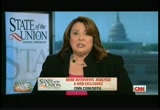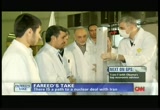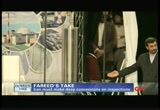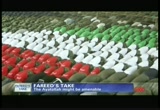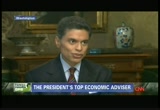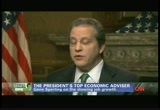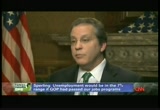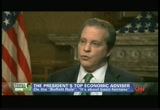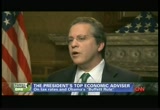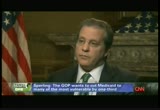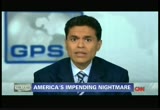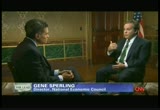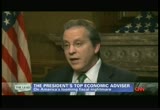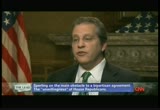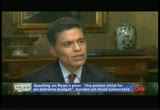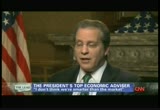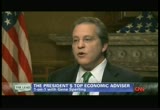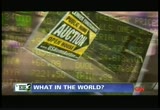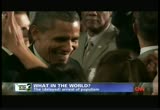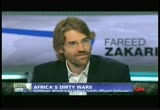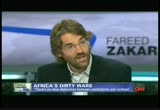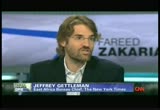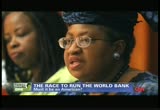tv Fareed Zakaria GPS CNN April 15, 2012 1:00pm-2:00pm EDT
1:00 pm
midwest, the series of coordinated attacks across afghanistan. i'm candy crowley in washington. find today's interviews, some analysis, web exclusive at our website cnn.com/sotu. fareed zakaria "gps" is next for our viewers here in the united states. this is "gps, global public square." welcome to our viewers in the united states and around the world. i'm fareed zakaria. we begin an important show with the most important topic today. the economy. to talk about it, we have no lesser an authority than president obama's top economic advisor, that's gene sperling, director of the national economic council. why isn't employment picking up? we'll ask him. then we'll go global. who should be the next president of the world bank? should it be an american, as always, or should it be opened up to emerging economies, in
1:01 pm
asia, africa, south america, nigeria's finance minister says she should be the bank's next leader, and she has some very influential supporters. we will talk to her. also, the new kind of warfare we're seeing pop up more and more. dirty wars. that's what the "new york times"'s jeffrey getleman calls them, and we'll talk to him about it. first, here's my take. as many regular viewers know, i have been following the tense back and forth with iran very closely. i continue to believe it is the single most dangerous crisis that we confront today. and i'm struck by the pessimism surrounding you it. everyone seems to believe that whatever the momentary ups and downs, there is unlikely to be a deal between iran and the great powers that will avert war and prevent iran from acquiring nuclear weapons. that's not clear. there is a path to a deal. if, as with any successful negotiation, both sides can come away with something.
1:02 pm
so what would a deal look like? the united states has long demanded that iran stop all enrichment of uranium, a process that allows it to produce the fuel necessary for an atomic bomb. iran has insisted it has the right to enrich for a peaceful nuclear program. now, there's a way around the deadlock. washington has signalled that it will ask iran to stop enriching uranium to 20% or more, the level from which fuel can easily be converted for military purposes. iran has indicated that it might be willing to accept a limit and would only enrich up to 3.5, or 5%. iran can claim it's right to enrichment, but it is very hard to weaponize from that level. there are the sticking points, but iran almost accepted a deal in 2009, and it proposed one in 2010. statements from officials in both sides suggest they might embrace elements of those proposals. the crucial point on which iran must make deep concessions is comprehensive inspections.
1:03 pm
the 2011 international atomic energy agency reports lays out a series of indicators that iran might be pursuing a weapons program. the great powers should use that as a checklist of activities that iran would commit to refraining from and insist that iran allow the iaea unfettered access to its sites until the agency is satisfied that any military program has been shut down. but iran would have to receive some award for allowing such unprecedented inspection, and the obvious option would be the relaxation of sanctions, step by step, as inspections proceed unimpeded. now, for any deal to stick, it has to be accepted by two groups. the first are the hardliners in tehran led by the supreme leader ayatollah khomeni. he might be amenable. he might be cure enough to accept a deal. he has beaten back the green movement, accommodated one key rival, sidelined another, president ahmadinejad. he has also given himself room to make some concessions on the
1:04 pm
nuclear program, saying recently, islam considers the possession of nuclear weapons a grave sin. but if iran does make concessions, the united states would have to be able to accept then and relax some sanctions. this is where the second important group, republicans in washington, could be an obstacle. if they demagogue the deal or refuse to reciprocate on sanctions, the whole thing will unravel. the administration has handled its allies, russia, china, the united nations, and even tehran with skill. to succeed now, however, it has to tackle its most formidable foe with whom it has not had much negotiating success so far. republicans. let's get started. gene sperling, thanks for joining us. >> thanks for having us.
1:05 pm
>> the job numbers that came out were not what people hoped. while the economy has generated some decent growth, it is not generating jobs at the pace that anyone would want or that the administration was predicting early in its tenure. why is that? >> well, i think if you look at the actual job creation you've had over 2011 and 2012, it actually would be solid in most other context. in 2011, we actually -- our economy actually created 2.1 million private sector jobs. and if you look at the first three months of this year, even with the fact that march was below expectations, it's still about 630,000 jobs. that's well -- that's over 200,000 a month. above the pace of another two million jobs a year. you're having very solid private sector job creation. the problem is obvious. we started in a very, very deep hole. when you are starting in a hole,
1:06 pm
you have a long way back, and so we just have to stay at it and stay at it. i will say that we never thought that the pace we were on was fast enough. that's why the president went out in september and proposed the american jobs act, $447 billion initiative, which people estimated would have added an extra 1 million to 2 million jobs. now, fortunately, it got the payroll tax cut, the veterans tax cut, the unemployment insurance, and those are helping, but just think about how much stronger the job market would be if just two of the things he had proposed that the republicans said no to had passed. one, teacher layoffs. secondly, construction jobs and infrastructure. i think if those two things had passed, we would be knocking on the door of going under 8%, being into the 7% unemployment, and making much further progress, but at least we've been able to pass the important
1:07 pm
components that at least have helped keep the recovery strong even with some of the headwinds. >> let me ask you about the buff felt rule. the buffett rule, it is suggested, is going to raise billions over the next ten years. he is going to spend $45 trillion. so is this about economics? is this about deficit reduction, or is it, as your critics charge, class warfare? >> i think what it is about is it's about the basic fairness and trust in our tax code and in our government, and it's about also putting together a larger deficit reduction plan that includes the values of shared
1:08 pm
sacrifice, so, yes, on the fairness side, i think when people call for tax reform, what a lot of people are talking about, typical americans, is, yes, they want less complexity in filling out their own taxes. the most well off people in our society can then actually end up paying less than a lot of middle income families who are struggling to make ends meet. the buffett rule is very simple. it says you can do all those kind of tax planning and you can do all want, but at the end of the day, there's kind of a flat rule. if you make over $1 million, you are going to play -- pay at least a flat 30% rate. now, on the numbers, if you kept tax rates where they are today, this would actually raise $160 billion, which is significant. $160 billion over ten years. and if you allowed the tax rates to go back to where they were in the clinton era for the most fortunate, which would be 39%, then it would raise $47 billion. well, of course, that alone isn't going to solve our deficit, but that's not the issue.
1:09 pm
the issue is that an important component of an overall deficit reduction plan? and the reason why i think it is is because people in our country are absolutely willing to sacrifice if they believe we're all in it together, there's shared sacrifice. when you look at the house republican budget, they're willing to cut medicaid for people with disabilities, poor children, people in nursing homes by one-third, 10 years from now, by $810 billion, and then at the same time they won't raise one penny in revenues. they'll actually have tax cuts that could give the typical millionaire $150,000. that breaks that kind of social compact. and we're not going to put those types of burdens on the most vulnerable people in our society just so we can keep people who are making over $1 million from contributing even a single penny to deficit reduction, which i think quite a lot of them are more than willing to do as part
1:10 pm
of a balanced, pro-growth, pro-deficit reduction package. >> but you don't have a tax reform plan, and the president has never proposed one. are you going to propose one? >> well, the president put forward, as you know, a corporate tax reform plan that brought the top rate down to 28%. had a lower rate for manufacturing, more around 25%, and had a similar type buffett rule for foreign earnings. basically saying minimum tax on foreign earnings. >> i mean a comprehensive 1996 type tax where you get rid of what is essentially get rid of most of the loopholes? >> i think the president believes that what he has done in individual tax reform is put out the principles that would guide a tax reform that would essentially be part of a bipartisan negotiation. then i think, you know, to be honest, you haven't seen any of the major parties go overly detailed on tax reform because i think, as we saw in 1986, in the end the day when this happens, it usually happens because there's a bipartisan negotiation where everybody works hard, you know, holds hands, and jumps
1:11 pm
together with it, and that's the kind of thing we would like to do, and i think the biggest problem that we've seen is just that there's been an unwillingness to understand that if you're going to be cutting spending and asking for constraints in areas like medicare and domestic spending, that raising revenues has to be part of a balanced deficit reduction plan, as every bipartisan agreement before has included, and as boles/simpson and other independent groups have called for and made a foundation of their deficit reduction plans. >> we will be back in a moment to talk more to gene sperling, the president's top economic advisor, about the new fiscal nightmare that might be headed our way. in just eight months time. we'll be right back. [ male announcer ] citi turns 200 this year.
1:12 pm
in that time there've been some good days. and some difficult ones. but, through it all, we've persevered, supporting some of the biggest ideas in modern history. so why should our anniversary matter to you? because for 200 years, we've been helping ideas move from ambition to achievement. and the next great idea could be yours. ♪ guys. come here, come here. [ telephone ringing ] i'm calling my old dealership. [ man ] may ford. hi, yeah. do you guys have any crossovers that offer better highway fuel economy than the chevy equinox? no, sorry, sir. we don't. oh, well, that's too bad. [ man ] kyle, is that you? [ laughs ] [ man ] still here, kyle. [ male announcer ] visit your local chevy dealer today. right now, very well qualified lessees can get a 2012 equinox ls for around $229 a month.
1:13 pm
[ sneezes ] [ male announcer ] if you have yet to master the quiet sneeze... ♪ [ sneezes ] [ male announcer ] you may be an allergy muddler. try zyrtec®. it gives you powerful allergy relief. and zyrtec® is different than claritin® because zyrtec® starts working at hour 1 on the first day you take it. claritin® doesn't start working until hour 3. [ sneezes ] [ male announcer ] zyrtec®. love the air. [ female announcer ] this week only, save up to $11 on zyrtec® products. see sunday's newspaper. [ roger ] tell me you have good insurance. yup, i've got... [ kyle with voice of dennis ] ...allstate. really? i was afraid you'd have some cut-rate policy. [ kyle ] nope, i've got... [ kyle with voice of dennis ] ...the allstate value plan. it's their most affordable car insurance -- and you still get an allstate agent. i too have...[ roger with voice of dennis ]...allstate. [ roger ] same agent and everything. [ kyle ] it's like we're connected. no we're not. yeah, we are. no...we're not. ♪ the allstate value plan. dollar for dollar, nobody protects you like allstate.
1:14 pm
this is my grandson. and if it wasn't for a screening i got, i might have missed being here to meet him. the health care law lets those of us on medicare now get most preventive care for free like annual wellness visits, immunizations, and some cancer screenings. and that's when they caught something serious on mine. but we could treat it before it was too late. i'll be around to meet number two! get the screenings you need. learn more at healthcare.gov. you don't want to miss any of this! the american economy seems to be doing better, but in eight months, the united states might find itself in a nightmarish fiscal mess.
1:15 pm
let me explain. three things are likely to come down around the same time. on december 31st, 2012, the bush tax cuts will expire. on january 2nd, 2013, the sequestration, or automatic budget cuts set in. sometime right around then, the debt ceiling limit is likely to be reached again. it will be a time when the american government as a whole has some very tough decisions to make very fast, and we've seen how poorly washington has stood up to great fiscal challengein the recent past, and if president obama does not win election, he will be a lame-duck president. so, gene sperling, president obama's chief economic advisor, is going to explain how we get out of all this. what are you going to do? how are you going to get congress to somehow find a will
1:16 pm
to compromise within a few weeks on big issues that they haven't been willing to do for two and a half years? >> well, first of all, i actually don't know. i don't think any of us know exactly when we hit the debt limit again. i think whenever that is, i would hope that we as a country would agree that however we fight and battle and argue over deficits that we are never ever again going to see anybody using the default of the united states for the first time in our history as a budget tactic. i hope that that will be off the table forever because it's -- it would be so harmful to our country and the credit standing that we've had since the time of alexander hamilton. now, the other two issues i think you're absolutely right, which is that we will face the prospect that on january 1st, if we do nothing, that we would see all of the bush -- so-called bush tax cuts for middle class and high-income americans essentially suet and taxes would go up for middle-class families and you would have the
1:17 pm
sequester across the board on defense and discretionary. when we agree to that type of sequester said, well, that's a good policy to do. it was just the opposite. the idea was that's supposed to be such an unthinkable policy and so equally odious to both sides that it will force us to come to the table and work on a more honorable bipartisan agreement which we know our country needs, and, you know, i don't think there's any other way to say it. the main obstacle to that has really been the unwillingness, particularly of republicans in the house of representatives, to recognize that everybody else in this country knows, which is that if we're going to do something about our deficit, part of it has to be solved with revenues, particularly revenues that ask those that are most well off to contribute, and i think we just have to hope that with those guns to our head, that this would be a time when
1:18 pm
we -- people would put ideologies aside and have the type of honorable compromise that would help our country move forward, but nobody knows, and we will have to -- we'll have to see how it goes. >> paul ryan this week said the president walked away from simpson-bowles. he set up the cantor-biden talks to fail. he set up a sequestration process that he knew would unravel. that he is not serious about deficit reduction. >> well, obviously, i could not disagree more, and while i like paul ryan personally, i do not think at this point he has contributed in any way to our country moving forward on a bipartisan deficit reduction plan that reflects shared sacrifice. i mean, paul ryan talking about walking away from a balanced plan like bowles-simpson is like, i don't know, somewhere between laughable and a new
1:19 pm
definition for chutzpah. he was on the commission and voted against it. that plan, the bowles-simpson plan, actually calls for raising more revenues than president obama has. so president obama says that as part of an overall $4 trillion deficit reduction plan, you should have $1.5 trillion of revenue. bowles-simpson says it should be more like $2 trillion. paul ryan says, not only is it zero, but he proposes cutting taxes more and doing everything on spending cuts. so he -- his budget has become the poster child for an extreme budget that puts all the burden on the most -- on the middle class and the most vulnerable, and it includes no revenue. when the core of bowles-simpson was a balance of revenue and entitlement savings and a principle that you don't put much burden at all on the most vulnerable in our society. >> finally, let me ask you about a speech you made. you made a speech that was
1:20 pm
characterized by 'the financial times" as an argument for industrial policy. i'm not sure i would put it exactly that way. it was an argument for aggressively helping manufacturing return to the united states. christina romer, who used to work at the white house, criticized this basically saying when you give preferences to some one specific set of industries, they sit in place forever. look at the subsidies for oil and gas. the market distorting. the whole process gets politicized, and it won't do very much to change the essential transformation of the american economy that is going on that is a way for manufacturing and towards services. >> i think that the idea of an industrial policy where people in the government try to pick winners and losers, what particular industry or types of industry will be successful, i
1:21 pm
think, is not wise. i don't think we're smarter than the market, so i don't support that active type of industrial policy, but, a core of economic policy is that there are certain types of investments in your country that have a stronger benefit to the country and the workers and the productivity as a whole than any particular company can fully capture. what i was arguing was that the broad area of manufacturing -- not a specific industry within manufacturing, but the broad area of manufacturing punches above its weight economically. think about it. 90% of patents come from manufacturing. 70% of private sector research and development comes from manufacturing. 60% of exports. i think, you know, i cited a lot of studies, but the one i thought was most compelling was one by the "harvard business review" where they point out that when you lose your manufacturing capacity even for a moment, you don't just lose your capacity to build that product, which maybe could be made cheaper somewhere else now. you lose your capacity to win the products of the future, and so, therefore, when we let our manufacturing capability erode, it didn't just hurt us at that moment.
1:22 pm
we lost competitiveness to other countries, south korea and others, that we never should have, so i think this is not industrial policy that's picking winners and losers. this is just recognized that there are certain types of economic activity that have a broader positive economic impact for our country as a whole beyond what it does for the specific companies and workers in those private sector entities. >> gene sperling, thanks for joining us. >> thanks for having me. >> that was gene sperling, president obama's top economic advisor. up next, what in the world. since the start of the global financial crisis, the political backlash has largely been from the right. think of the tea party. so where is the left? we'll explain up next. tdd# 1-800-345-2550 let's talk about fees.
1:23 pm
tdd# 1-800-345-2550 there are atm fees. tdd# 1-800-345-2550 account service fees. tdd# 1-800-345-2550 and the most dreaded fees of all, hidden fees. tdd# 1-800-345-2550 at charles schwab, you won't pay fees on top of fees. tdd# 1-800-345-2550 no monthly account service fees. tdd# 1-800-345-2550 no hidden fees. tdd# 1-800-345-2550 and we rebate every atm fee. tdd# 1-800-345-2550 so talk to chuck tdd# 1-800-345-2550 because when it comes to talking, there is no fee. fight both fast with new tums freshers! concentrated relief that goes to work in seconds and freshens breath. new tums freshers. ♪ tum...tum...tum...tum... tums! ♪ [ male announcer ] fast relief, fresh breath, all in a pocket sized pack.
1:24 pm
when we were determined to fast resee it through.ath, here's an update on the progress. we're paying for all spill related clean-up costs. bp findings supports independent scientists studying the gulf's environment. thousands of environmental samples have been tested and all beaches and waters are open. and the tourists are back. i was born here, i'm still here and so is bp.
1:26 pm
1:27 pm
concern about risk, too much debt. so you would imagine that a political backlash would involve a move toward the left. well, no. instead, we saw a shift towards the political right in much of industrialized world. >> god bless you tea party, americans. >> here in america the tea party was born, pulling conservatives further towards the right. consider that in the 2008 election, mitt romney was considered the conservative challenger to john mccain. in this election, he is the moderate, outflanked on the right by every other candidate. this dynamic seems afoot in europe as well. britain's conservatives return to power after 13 years. german's merkel and sarkozy cemented their positions. spain has a new conservative government. what happened to the left? why was there no great surge in
1:28 pm
left wing populism? my own theory that in the crisis the state had to jump in dramatically to stop a depression, but those actions, taking over banks or car companies, guaranteeing debt and mortgages, scared the hell out of people on the right who saw it as the beginning of a new socialism. the left never mobilized. the occupy movement channelled popular discontent into its process, but it never had a really coherent program and never gained traction. that seems to be changing. the french elections may prove to be the beginning of a new trend. the socialist party's francois alleande is proposing a 75% tax rate on people earning more than 1 million euros. now he has been upstaged by an opponent, who said he would impose 100% tax rate on all earnings above half a million dollars.
1:29 pm
and these left-wing candidates are polling well. consider on a much smaller more timid scale, president obama's 2012 campaign, which is moving somewhat to the left both in style and substance as he takes the buffett tax on the road. >> i was with warren buffett a couple of days ago. he said thanks for naming a rule after me. >> consider even the pirate party. this is a european political network that was founded on the basic platform that information should be free. they wanted to legalize online file sharing, minimize copyright protections. i reported last october how the german offshoot of the pirates won enough votes to enter the berlin state legislature. critics thought it was a flash in the pan. berlin is an urban city state with a lot of rebellious young college students, but last week, the pirates scored a second win
1:30 pm
in the gentrified state on the french border. they won 4% of the vote to enter parliament. polls now suggest that not only will the pirates enter two more state legislatures next month, they have also become germany's third most supported party. so a new left wing group with no real platform on energy, taxes, or foreign affairs is now the third most popular party in europe's leading economy. ♪ we might be seeing the beginnings of a left-wing response to the crisis channelling popular discontent. some of it is very extreme. some of it is whacky. perhaps the larger function of these groups will be not actually to get elected to run a government, but to do what the tea party seems to have done, to use its voter base to pressure moderates. the tea party made the right more right, and then don't be surprised if france's left and europe's pirates make their governments more attentive to the left. so, we may be in for more idealogical strife in the west. up next, dirty wars. my next guest says that's the way conflicts are being fought
1:31 pm
and will be fought going forward, and that joseph kony is the perfect example of this phenomenon. back with that in just a moment. [ camera clicks ] ♪ it's hard to resist the craveable nature of a nature valley sweet & salty nut bar. for a hot dog cart. my mother said, "well, maybe we ought to buy this hot dog cart and set it up someplace." so my parents went to bank of america. they met with the branch manager and they said, "look, we've got this little hot dog cart, and it's on a really good corner. let's see if we can buy the property." and the branch manager said, "all right, i will take a chance with the two of you." and we've been loyal to bank of america for the last 71 years. dave, i've downloaded a virus. yeah. ♪ dave, where are we on the new laptop?
1:32 pm
it's so slow! i'm calling dave. [ telephone rings ] [ male announcer ] in a small business, technology is all you. that's why you've got us. at the staples pc savings event, for a limited time get up to $200 off select computers. staples. that was easy. [ roger ] tell me you have good insurance. yup, i've got... [ kyle with voice of dennis ] ...allstate. really? i was afraid you'd have some cut-rate policy. [ kyle ] nope, i've got... [ kyle with voice of dennis ] ...the allstate value plan.
1:33 pm
it's their most affordable car insurance -- and you still get an allstate agent. i too have...[ roger with voice of dennis ]...allstate. [ roger ] same agent and everything. [ kyle ] it's like we're connected. no we're not. yeah, we are. no...we're not. ♪ the allstate value plan. dollar for dollar, nobody protects you like allstate.
1:34 pm
the allstate value plan. mom: doug dad: ya mom: the magician from kyles birthday party is still here gician: ah uh dad: ya i had to sign a two year contract with him dad: so amazing larry is going to be staying with us for a while magician: this is our home now son: yeah voiceover: birthday magicians don't have long term contracts the internet should be like birthday magicians get clear unlimited 4g take it with you internet with no long term contracts and no data limits plans start at $34.99 a month call or go online today clear the way the internet should be
1:35 pm
six weeks ago, very few people outside of africa had any idea who joseph kony was. today, at least 87 million people do. that's how many people have watched the viral video on youtube about this brutal ugandan warlord. my next guest, jeffrey getleman, has known about kony for years. in fact, he was embedded with the army on the hunt for kony two years ago. gettelman is the east african bureau chief for the "new york times," and he happens to be here, and i wanted to him about kony and about al qaeda in africa and africa and its prospects in general. thank you for stopping by. >> it's good to be back. >> what was it like to be with the ugandan army while it was trying to find joseph kony? >> it was a pretty amazing experience. the ugandan army has been pursuing kony for years, and now they're stretched away from uganda. they've gone into sudan, south
1:36 pm
sudan, central african republic, congo. they invited me to go with them on this manhunt. it was some of the roughest terrain i have ever experienced. i mean, impenetrable jungle that we were hacking our ways through. walking up, you know, to our necks in this black water, these rivers that flow through the jungle. there was this leaf that these ugandan soldiers had warned me about. they said whatever you do, don't touch this leaf as you're walking through the jungle, and i was wearing full clothes, of course, and i brushed up against it once, and my whole body itched. and i'm convinced there are things in that congolese jungle that science has yet to discover. >> you had a machete? >> i actually didn't. i was so incapacitated just trying to keep up with these guys. these soldiers are as tough as steel, and it got to the point they were carrying my gear. you know, i was just trying to stay -- survive out there. but the bigger issue is this guy, kony and the lra, has been brutalizing people for 25 years,
1:37 pm
and they go to where states are weakest. when uganda was having a lot of trouble in the '80s, the lra was very powerful, and then uganda got its act together. the military drove the lra out of uganda, so they just gravitated to the next sort of disaster zone, when was congo. >> and is joseph kony the worst of the worst, because that's the implication in the video, but is he? >> i think he is. i think that video has taken a lot of criticism for oversimplifying the issues, which maybe it did, but i do think the core issue that the video raised is pretty valid, which is this guy, kony, is a brutalizer. he has been terrorizing civilians in central africa for more than two decades. his group will continue to do that as long as he is around. >> why can they not find him? >> because it's an area the size of california with supposedly 250 militants in it, and it's this thick impenetrable jungle. when we are fly flying over it, you can't see anything. aerial surveillance doesn't work. it has to be an old-fashioned,
1:38 pm
you know, on-the-ground manhunt, and that's what i did with these guys. >> you talk about in a new york review of books article you talk about how this battle between joseph kony and the ugandan army is emblematic of the new war in africa. >> to me, it's interesting. if you look back at africa 20 or 30 years ago, there were many liberation wars. there were wars against apartheid and colonialism still. then there were wars against despots, and many of the rebel leaders that led these rebellions against despots, uganda's president, they were organized. they had ideologies. they had -- these rebel leaders were very well educated, and they put together these movements that sought to get territory, to liberate people, to introduce a new way of governing, and to deliver palpable benefits to the population, and we see that in these countries. there are criticisms they're not democratic, but the quality of life has improved dramatically in all those countries i mentioned. today, it's a totally different
1:39 pm
landscape. rebels are known for brutalizing civilians. they're not fighting for anybody. the lra is the best case of this. who do they fight for? who do they represent? what's driving them? what's their ideology? what could you offer them to entice them to come out of the jungle? that's the problem. so, in addition to this sort of fragmentation and increased violence, these wars go on and on and on because there's nothing you can offer kony. he doesn't want a seat in the government. he's not standing up for the rights of a repressed people. he is not even motivated by any commercial enterprise, like these groups in congo that are seizing minerals. >> you once wrote a piece, which i was very struck by years ago in "foreign policy," in which you pointed out that explains the phenomenon of child soldiers because with adults you have to indoctrinate them with ideology, but you don't have an ideology, so you can't get adults to follow you. >> that's exactly right. there's a connection of why we're seeing all these child soldiers and the proliferation of that across africa. these new rebel groups don't stand for anything, so nobody wants to join them, and they're
1:40 pm
very brutal. like the lra. they cut off people's lips. they rape women. they burn down villages. just gratuitously. there's no strategic purpose here. nobody is going to volunteer to joan them. the only way they can sustain themselves is kidnapping children and then brainwashing them. and the lra, that's another reason why these guys are so brutal is most of the soldiers in there were kids, you know, 7, 8, 9 years old who are kidnapped from their families, swept away, and then trained to kill, and that's part of their indoctrination. you know, they say to these kids, you know, here's a club. you have to beat this person to death or we're going to kill you, and that, you know -- that just breeds this almost psychopathy in these groups, and that's why it's so hard to end these wars. even -- they're not really wars. i call them unwars or dirty wars. there's no clear territory. there's no clear distinction between combatants and civilians. we see this across africa. it's not just the lra. we see this in congo. we see this in sudan. we see this in the sahara. and some of it has to do with
1:41 pm
the cold war. the cold war imposed some order on africa. there was a lot of manipulation, a lot of weapons that flowed in, a lot of bad things that happened. but there was more eyes on africa in a way then because africa was seen as strategically important. and places like central african republican where kony is now, nobody really cares about it, and that's why he is able to do what he is doing there. >> are the pirates that we hear about another version of this phenomena, no ideology, but essentially criminal gangs? >> yeah. i mean, the pirates, they just won't quit. it's amazing that the longevity and the ambition of these guys. there was just a hijacking where the pirates attacked a ship in the maldives, something like 2,000 miles east of somalia. and these are, you know, uneducated guys with rusty guns and flip-flops, you know, setting out to sea and, you know, derelict boats. they use mother ships now, which is like a hijacked tanker that they've taken, and that's their
1:42 pm
floating base. and they go out as far as they can go, and then they send out skiffs. it's a symptom of a failed state. the pirates are successful in somalia because they have a place to retreat to. there are still large parts of the country that are lawless. and in -- under the authority of various clan militias or criminal gangs. until somalia -- until somalia stabilizes, you know, from end to end, the whole country until there's a really strong government or a functioning government that can control territory, we're going to see -- the piracy problem isn't going to go away, but it's getting harder for them. there's been a naval response that has made it harder to hijack ships. more pirates have been arrested. i think these two things are happening at the same time. as i wrote in this story about mogadishu, with the advent of more businesses and more sort of normal life, there's going to be an alternative for young men to take a normal job. and i met guys that were trying to get out of the killing business. they were militia fighters, and they had spent years carrying a
1:43 pm
gun and working for this warlord or that warlord, and they said, you know, i just want to be a driver. i just want a normal job. and that wasn't really possible until recently. now mogadishu is just a piece of it. there's a big country and a lot of it is still very underdeveloped and poor, but as these -- as the country gets more stable and there's more economic opportunity, you're going to see the appetite for piracy go down because, you know, i've interviewed countless pirates, and that's what these guys say. they say it's a really crappy lifestyle. we go out on sea for, you know, for weeks. we don't have enough food. we don't have enough water. our comrades drowned. you know, it's not an easy living, and if there was something else to do, we would do it. >> you know, there's a famous harvard professor who always said that for most of the world, africa really falls in this category, americans never understand that the issue is not the kind of government, but the degree of government. that they just have a government that can actually control the territory it claims to control. jeffrey, pleasure to have you
1:44 pm
on, as always. >> thank you. and we will be back. the chevy cruze eco also offers 42 mpg on the highway. actually, it's cruze e-co, not ec-o. just like e-ither. or ei-ther. or e-conomical. [ chuckling ] or ec-onomical. pa-tato, po-tato, huh? actually, it's to-mato, ta-mato. oh, that's right. [ laughs ] [ car door shuts ] [ male announcer ] visit your local chevy dealer today. now very well qualified lessees can get a 2012 chevy cruze ls for around $159 per month.
1:45 pm
e.p.a. estimated 36 miles per gallon highway. this is my grandson. and if it wasn't for a screening i got, i might have missed being here to meet him. the health care law lets those of us on medicare now get most preventive care for free like annual wellness visits, immunizations, and some cancer screenings. and that's when they caught something serious on mine. but we could treat it before it was too late. i'll be around to meet number two! get the screenings you need. learn more at healthcare.gov. you don't want to miss any of this! what makes us number one in motorcycle insurance? we love bikes. we love riders. and most of all, we love to ride. perfect hair every time.
1:47 pm
1:48 pm
this year, there was a strong movement to change that system. nigeria's finance minister is a former managing director of the world bank. now she wants to be president of that organization. she has influential support. 39 former managers and economists at the world bank have endorsed her. "the financial times" and the economist are argued that she is the best candidate. what does she have to say? well, she joins me now from nigeria. welcome. how are you? >> thank you, fareed. i'm fine. >> tell me, do you feel that the president -- the president of the united states picked to head the world bank is unqualified in the way that the economist
1:49 pm
the way that the economist editorialized this week? the argument is not really about nationality. the development of the world bank as well as the g20 have signed on to accept a transparent process. that means that it should be done based on who from anywhere, regardless of nationality. so i think that, you know, we talk about that seriously. the leaders of the continent of africa who asked me to be a nominee, i think, took this seriously, and that's why i put myself in the contest. >> so do you think -- for you, is there a qualification primarily that you are from nigeria, a country that has historically been a recipient of world bank aid, or is it your personal characteristics? how do you see your strongest calling card? qualification has not to do with the fact that i'm from nigeria or even african. i'm an african who has worked all over the world.
1:50 pm
in almost every region. my qualifications are based on the experience i've had, both working in the world bank, but also very importantly at the finance of minister, four years of experience as finance minister and foreign affairs minister, in a complex, developing company. so i've seen the world bank operates from both inside and also importantly outside. but i've also lived in poverty. i know what the issues are. i've seen what it means to fetch water from a stream as a young girl growing up in nigeria. i've seen what it means to live in a country that has experienced conflict and that has lost many years in development because of that conflict. so many of the situations that the world bank is trying to grapple with, i've actually lived them and managed them every day. so i think those are the qualifications. i have the background, i have the experience, i have the training, and i also have the
1:51 pm
ability to get up and go and move there immediately. >> if you do not get it, do you think the credibility of the world bank will suffer almost irreparably, that the united states was able to put somebody up and all the experts are saying you're more qualified, but at the end of the day, the u.s. pick still wins? >> well, i'll need the rest of the world to ask the question of what it means. you know, if the process is set to be open, we would like to know what criteria is used to judge whoever the winner is. i think that's the important thing, that there should be more openness and disclosure about how the conclusion was arrived at. and whoever it is that wins, i wish them the very best of luck, including myself, and we should make sure that whoever wins is able to bring this very wonderful constitution to do what it's supposed to do, which is to help improve the lives and
1:52 pm
the living standards of poor people all around the world. >> ngozi, thank you very much for joining us. we wish you all the best in the very important weeks ahead. up next, an odd food festival in a place that has very little food. we'll be back. now, in every box of general mills big g cereal, there's more whole grain than any other ingredient. that's why it's listed first. get more whole grain than any other ingredient... just look for the white check. fight both fast with new tums freshers! concentrated relief that goes to work in seconds and freshens breath. new tums freshers. ♪ tum...tum...tum...tum... tums! ♪ [ male announcer ] fast relief, fresh breath, all in a pocket sized pack.
1:53 pm
1:54 pm
1:56 pm
this week, rick santorum left the republican race for the white house, seeming to solidify romney as the nominee it's been a harsh primary. according to the center for responsive politics, the pro-romney super pac has spent $35 million in negative tv ads against rick santorum and newt gingrich. which brings me to the question of the week. which of these countries has banned attack ads altogether and even started a federal institute to closely monitor broadcast ads, asking campaigns to remove ads that break the rules? a, mexico, b, australia, c, brazil, or d, canada. stay tuned and we'll tell you the correct answer. go to cnn.com/fareed for more of the gps challenge and lots of insight and analysis. also, you can follow us on twitter and facebook. remember, if you miss a show, go
1:57 pm
to itunes. you can get the audio podcast for free or you can now buy the video version. go directly there by typing itunes.com/fareed into your browser. this week's book of the week is john louis gatis' biography of george kennan. gaddis, the yale historian, had unprecedented access to kennan. it shows this is a book rich in detail and rich in insight about a fascinating but troubled man, just a great biography. and now for the last look. it's not all missiles and mischief in pyongyang these days. despite the dire state of the nation, the north koreans have had time for fun. earlier this month, they threw a food festival, repeat with sturgeon, soft shell crab, bullfrog, and other "famous dishes." the sign sed, in english, cook
1:58 pm
festival of holiday of april. not sure if this one is a pig or a fish, and is it blackened on purpose? and what's this one? did they borrow bread from close jewish friends and put kiwis on top? this ridiculous display put on by the government in a nation where as many as 3 million people are at risk of starvation. and to make matters worse, north korea recently got cut off from american food aid. north korea, the land of unique tastes and dreadful policies. the correct answer to our gps challenge question is, a, mexico has banned political attack ads. the new rules in effect in this year's presidential election were put in place after the contentious 2006 presidential election, during which candidates were unflattering compared with hugo chavez. thanks to all of you for being part of my program this week. ly see you next week.
1:59 pm
hi, i'm gary tuchman. here's a quick look at today's top stories. a second round of severe weather is threatening millions of people in the midwest, less than 24 hours after a massive tornado outbreak hit the region. more than 122 suspected tornadoes ripped through four states. five people were killed in one oklahoma town. dozens of people were injured and hundreds of homes were destroyed. overseas now, there were deadly attacks in the capital of afghanistan. insurgents targeted several key areas of kabul, including the embassy area and the parliament. u.s. ambassador ryan crocker said no americans have been hurt, but a number of afghans have been killed. the taliban have claimed responsibility, saying it's the start of their spring offensive. north korean leader kim jong-un addressed thousands of troops today. the country is celebrating the 100th anniversary of the birth of the nation's founder and un's grandfather. a military parade featured what appeared to be a new larger ballistic missile, but definitely
211 Views
IN COLLECTIONS
CNN Television Archive
Television Archive  Television Archive News Search Service
Television Archive News Search Service  The Chin Grimes TV News Archive
The Chin Grimes TV News Archive 
Uploaded by TV Archive on

 Live Music Archive
Live Music Archive Librivox Free Audio
Librivox Free Audio Metropolitan Museum
Metropolitan Museum Cleveland Museum of Art
Cleveland Museum of Art Internet Arcade
Internet Arcade Console Living Room
Console Living Room Books to Borrow
Books to Borrow Open Library
Open Library TV News
TV News Understanding 9/11
Understanding 9/11